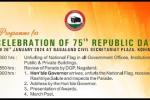

TOKHU EMONG - LOTHA TRIBE
The Tokhu Emong is the harvest festival of the Lothas. With the harvest done and the granaries full, the people now take a respite from the toils and sweat and settle down to enjoy the fruits of one'shard labor.
Tokhu Emong is celebrated in the 1st week of November every year and it stretches over to 9 days. Earlier, no particular date was fixed. However, in order to carve unity and uniformity among the ranges, Wokha elders decided to· celebrate it on a fixed date. Following this, Tokhu Emong is celebrated on November 7, every year.
During this festival, the entire Village takes part in the celebration. Every household have food and drinks prepared for the feast. Friends, families, neighbors are invited to each other's house and this continues for 9 days. The main features of the feast are community songs, dances,feast, fun and frolic. Everyone attires themselves in their beautiful traditional dresses and costumes according to their social status. There is an air of gaiety and light hardheartedness everywhere. Gifts of food and drinks are exchanged during the Festival. Among friends, the number of cooked meat given notes the depth of friendship and ties. For example, if one man offers 12 pieces of meat to his friend, it shows that he treasures his friendship, if it is reciprocated, and he is also offered 12 pieces of meat, it means that the friendship is valued from both sides.
In this case, should any disaster or misfortune strike either one of them, both of them will stand by each other no matter what. Thus a friendship of loyalty and fidelity was pledged. In case ofmere acquaintances or platonic ones, only 6 pieces of meat are exchanged.
It is the Priest who gives the signal for the start of the festival. He accompanied by Aides (Yinga) along with baskets goes round the village collecting unhusked rice from every home. When offering is made, the Priest takes a handful of it, showers prayers and it is only after this that he puts the contribution in his basket. The belief was that the more generous the contribution, the more yield one would get during harvest but if anyone refuses to contribute, he would lead a pauper’s life. So, none would dare to refuse contribution for fear of that. A portion of the collection is used to buy a pig and the rest is used for making rice-beer. The pig is killed and cut and is distributed to the contributors. This ritual is considered as contributing factor to general prosperity.
Before the commencement of the festival, if any stranger happens to be in the village, he gets two options; to leave the village (past beyond the village gate) before sunset or to stay there in the village until the festival is over. He however, enjoys the warm hospitality of the villagers. This festival also provides the occasion to offer prayers for the departed souls. The family who lost any member during the year performs his/her last rites. The people remain in the village till the last rites are performed.
Young boys and girls engaged during the year are happily married after Tokhu. It is also the time for renovating the Village gate, cleaning wells and repairing houses.
Tokhu Emong is also a festival of thanks giving,sharing and reconciliation but the most beautiful aspect of this festival is that past rancorous are forgiven, new ties are formed and bonds of closer intimacy are formed.
Wild cries of joy-echo over the green hill sand narrow valleys. One feels as if the stones have been given tongue to say 'OHfarmers, tender your fields with love and care'.






